
With fewer sedans on the market in general, let alone sedans with rear-wheel drive and manual transmissions, what’s an enthusiast to do? Enter Genesis. I had the opportunity to drive the 2019 Genesis G70 back-to-back with… the 2019 Genesis G70. Allow me to explain.
Genesis, first launched as a large luxury sedan under the Hyundai marque, has become its own brand in recent years. Though Genesis’ initial focus was on providing larger, luxury sedans (the G80 and G90) to the American market, the compact G70 was introduced in mid-2018 and positioned as a nice-yet-sporty offering.
The 2019 Genesis G70 is available in rear- or all-wheel drive, with a 2.0 liter turbocharged four-cylinder or 3.3 liter twin-turbocharged V6. The four can be had with a six-speed manual transmission or eight-speed automatic, while the V6 must be paired to the automatic. The two Genesis G70s I drove were rear-wheel drive models – one 2.0L and one 3.3L. Nate’s 2.0L had the optional six-speed manual, which he specifically sought out.
The Genesis G70 2.0 makes 252 hp and 260 lb-ft of torque. Paired to the manual transmission, acceleration met my expectations both in urban driving and on winding back roads. The manual transmission has longer throws but positive engagement and good feel. Clutch action was light enough that it didn’t annoy me in heavy DC-area traffic leaving the city. The G70 2.0 isn’t the fastest option in a straight line, but I enjoyed the level of power combined with the row-your-own gearbox. Much like an older, lower-power BMW, I had to work for the power a bit, but enjoyed the process.
By comparison, the G70 3.3 is a rocket. Power is up substantially, thanks to the addition of two cylinders and another turbocharger. The 3.3 is rated at 365 hp and 376 lb-ft, and you feel the difference right away. It’s a shame the manual isn’t offered with this engine, as I think it would pair well enough. Regardless, the paddle shifters allow for manual control of the eight-speed automatic, and the setup is responsive enough for back-road fun.
Aside from the engine and transmission differences, both Genesis G70s were equipped similarly. They shared excellent seats, a nicely-trimmed cabin, and big Brembo brakes on front and rear axles. They both handled with competence, regardless of the 2.0’s traditional shocks or the 3.3’s adaptive setup. Both shared the same feeling from the rear as I entered sweeping turns, as if you feel the rear suspension really take a set through the corner.
So, which one did I prefer?
Truthfully, both Genesis G70 variants were fun to drive. The big difference comes down to weight. With two fewer cylinders and one fewer turbocharger, the Genesis G70 2.0’s engine bay isn’t as full. There’s less weight hanging out in front of the front axle and you can see daylight with how much space is left. U.S. News & World Report claims a 194 lb weight difference, with the G70 2.0 being the lighter car.
And you feel that lack of nose weight on every corner. The G70 2.0 is a bit more athletic on back roads, lending to a more tossable feel that I preferred. The G70 3.3 will win in every drag race, but isn’t as eager to turn in by comparison.
Prior to this comparison, I hadn’t sampled anything from Genesis to date. I knew they were coming for Ze Germans in an attempt to bring more sporty daily drivers to the market. Both variants of the Genesis G70 have succeeded in that mission, but they take two different approaches in doing so.
See more at Out Motorsports, a site created to not only share the pursuits of LGBT motorsports competitors, but to encourage others to get behind the wheel and participate as their full selves.